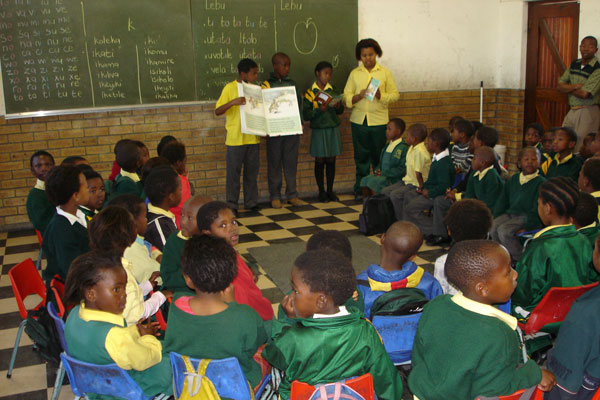Pretoria – Basic Education Minister Angie Motshekga says she is confident that the Curriculum and Assessment Policy Statement (CAPS) is a game changer that has put the country’s education system on the right track.
Education on the right track, says Minister
“When I was appointed in 2009, the first thing I wished for was to deal with the curriculum.
“CAPS is much more clearer on what needs to be taught, how it should be taught, the assessment and the cognitive rigour that is needed in our schools, and many other things that are necessary for stability,” Minister Motshekga said.
She was addressing The New Age business briefing held in Sandton on Tuesday.
2014 marked the first year that CAPS was tested at matric level. The CAPS curriculum was phased in during 2012 in grade 10, 2013 in grade 11 and 2014 in grade 12.
The National Curriculum Statement (NCS), Grades R – 12, underpinned by CAPS, was also implemented in 2014 in the Senior Phase (grade 7, 8 and 9) for the first time.
Minister Motshekga said the intention of CAPS is to improve the standard and quality of curriculum implementation. CAPS encapsulates the new promotion requirements, which are considerably higher than the previous promotion requirements.
The Minister said it is recommended that the curriculum is kept for 10 years.
“Umalusi [Council for Quality Assurance in General and Further Education and Training] confirmed it is a good curriculum.
“It has been benchmarked internally – it is a good curriculum. It is not yet perfect, it can still be improved. All of us are satisfied that at least we have something we can continue to improve on,” she said.
Minister Motshekga said she was excited about CAPS being rolled out in 2014, although demands were much higher on both teachers and learners to train teachers and implement the curriculum.
Minister Motshekga’s deputy, Enver Surty, said the department has raised the bar and that means the paradigm has changed. Learners have to be encouraged to be more creative, innovative and more critical in terms of responding to questions.
“The scope of their knowledge has to be expanded and become much more relevant to the demands of our current society. This means we have to review the curriculum content so that it is responsive to the social and economic demands,” the Deputy Minister said.
He said there is now a national standard of examining and measuring the ability of learners across the system.
“There is also uniformity in terms of content as CAPS outlines what needs to be done, when and how… so there is no confusion when it comes to that,” he said.
He said the department has also managed to bridge the gap between deep rural schools and urban schools.
Quintile system
Minister Motshekga said South Africa uses the quintile system to classify schools according to the economic profiles of communities and certain infrastructural factors.
Quintile 1 is the ‘poorest’ quintile, while quintile 5 is the ‘least poor’. Each quintile, nationally, contains 20% of all learners but not 20% from each province.
Schools in quintile 1, 2 and 3 have been declared no-fee schools, while schools in quintiles 4 and 5 are fee-paying schools.
“Quintile five schools are found in areas where parents are able to support the system. They pay fees, buy their children books and also run their own School Governing Bodies (SGB). They are the most affluent schools,” said Minister Motshekga.
Quintile one schools are found in deep rural areas, townships and informal settlements and are the poorest.
“… We provide meals and free schools… For poorer communities, we need to provide more support,” said the Minister.
She said about nine million learners in South Africa are found in quintile one schools.
Gauteng’s glory
Gauteng came out tops in the results announcement, with matric learners having recorded an 84.7% pass rate.
Gauteng Education MEC Panyaza Lesufi said he attributes this to the support by the national department, Premier David Makhura, learners and teachers alike.
To keep the winning streak going, MEC Lesufi said they would make sure that the playing field is levelled for all learners.
“We want to introduce what we call common examinations… I am also an agent for Information Communication Technology (ICT) education. Gone are the days of using old teaching methods,” he said.
Group copying
Meanwhile, Minister Motshekga said the department is still going to investigate group copying that occurred in some of exam centres.
“There was a level of desperation, which means curriculum coverage was not properly done and that may have resulted in desperation of group copying.
“There was just a lot of instability in KZN… We still need to go and find out what led to KZN not finishing the curriculum,” the Minister said. – SAnews.gov.za








